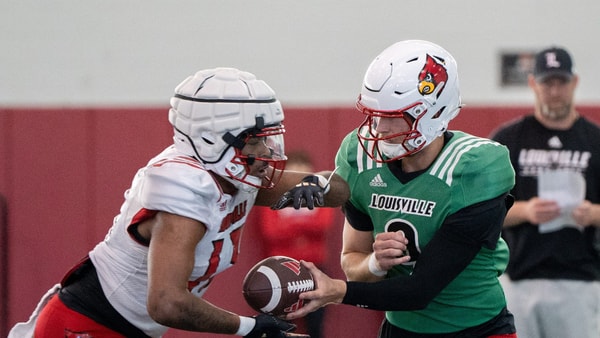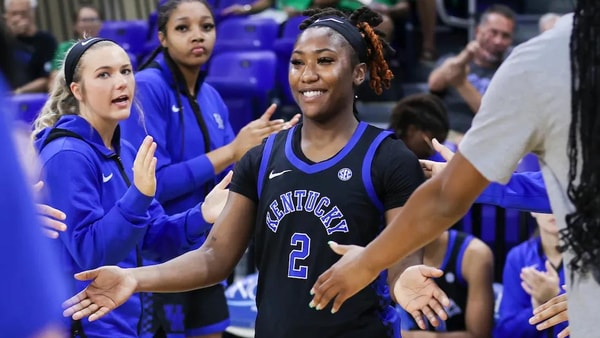
In today's sullied, hyper-commercialized, sneaker-war-driven paradigm of "amateur" athletics, there's something uniquely transcendent about the Kentucky high school basketball state championship tournament. Stripped of its excesses, the "Sweet Sixteen" is hoops at its purest, especially when a small-town team pulls off a David-like upset, proving the egalitarian nature of sport, and capturing the imagination of the Commonwealth.
As a high school sophomore in 1983, I bore front-row witness to one of the most magical moments in tournament history. But in a
Hoosiers-in-reverse, Goliath won: My big city Henry Clay Blue Devils captured a 35-33 victory over the tiny town Carlisle County Comets, when Greg Bates (42, above) put back an errant Steve Miller (50) heave as time expired in the third overtime.
David Rambo had an even better view of the buzzer beater. The Comet senior starting guard was standing at the top of the key as he watched his brilliant high school career come to a heartbreaking conclusion.
"It really hurt; it hurt everybody because we had worked so hard for so many years to get so close," Rambo recounts. The county had consolidated its elementary schools when Rambo was in the third grade; and Bob Petrie, a local P.E. teacher, had recognized the talent these young kids shared, and started training them for the future. "Early on, we set a goal of going to the state tournament," Rambo remembers. "That season, we won more games than any team in state high school history...Getting that close to a childhood dream, to lose on what was really an air ball, that hurt, that really hurt."
Rambo today recognizes the upside of the team's unlikely journey, as do most locals. Greg Terry, a lifetime native who now serves as Carlisle County Judge Executive (sort of the mayor of the county), revels in the memory: "It was the biggest thing...the most exciting thing that ever happened in Carlisle County...There weren't enough people in Carlisle County to put a fire out, and yet the whole state was watching us and rooting for us."
===
Unfortunately, today, most Central Kentuckians couldn't tell you where to find Carlisle County on a map. Indeed, the next time you hear a politician trot out the hackneyed cliché, "I've crisscrossed the state, from Paducah to Pikeville," they're leaving out Carlisle and the three other Kentucky counties that border the Mississippi River (Ballard, Hickman and Fulton) which are even farther west than "far-western" Paducah.
Ignoring the River Counties isn't simply a rhetorical mistake made by candidates. As the Golden Triangle thrives economically and the struggling Appalachian East receives well-deserved attention from our political leaders, far-western Kentucky -- or what locals call "the real Western Kentucky" -- too often feels abandoned.
It wasn't always that way. In the 19
th Century, the Mississippi River served as the nation's economic backbone, with steamboats hustling our country's manufacturing and agricultural exports toward destinations far overseas. The Great Mississippi was intimate part and parcel of our national zeitgeist. In the greatest American novel, Samuel Clemens (using a pen name inspired by his time as a riverboater) captured the adventures of Huckleberry Finn and his pal Tom racing toward freedom just north of Kentucky's Ballard County, located at the intersection of the Mississippi and Ohio Rivers.
The 20
th century brought speedier planes, trains and automobiles; and then, at millennium's end, a collapse in the U.S. manufacturing economy. Kentucky's River Counties suffered acutely: The region's best and brightest fled for higher-paying jobs; formerly thriving small communities began to resemble ghost towns.
The region didn't lose its beauty, however: It features some of the most glorious natural settings, and remains a very popular destination for hunters, fishers and hikers. The residents didn't lose their commitment to the future, either: The counties boast of a strong agri-business tradition and some of the most highly ranked public schools in the state. And they didn't lose their spirit: The kind and compassionate people of the area pride themselves as the living embodiment of the admonition to "love your neighbor as yourself."
Now, the River Counties have been presented with a once-in-a-lifetime economic opportunity. As was the case in 1983, the whole state of Kentucky shold be watching Carlisle County and its neighbors.
It all has to do with an historical development more than 3500 miles to their south.
Last Sunday, a Chinese mega-ship sailed through the Panama Canal; the first vessel to enter since completion of a decade-in-preparation $5 billion expansion. With a new lane, deeper water supply, and higher-tech mechanics, the Panama Canal now enables a doubling of the waterway’s capacity, and nearly a tripling of its ship cargo loads. A much larger generation of shipping vessel, the New Panamax, will now serve as a competitive counterpoint in the ever-evolving transport business.
The global economics of importing and exporting will be forever changed. Before expansion, Asian exports to the U.S. typically have been shipped to California ports, where they are then taken by truck or rail to destinations east. But with West Coast ports over-crowded and troubled by labor conflicts -- and with the cost of cross-country ground transport hostage to volatile fuel prices -- global exporters now are presented with a new cost- and energy-efficient option: transporting cargo via mega-ships that sail through the Panama Canal, up the Mississippi, to the Ohio, toward Midwest and Northeast customers. In this new shipping archetype, Kentucky's River Counties are ideally situated: at the confluence of the two great rivers, within 2 and 1/2 hours of St. Louis, Memphis, Nashville and Evansville, and within a workday's driving distance of nearly 70% of the nation's population.
The new economic model coincides with a new economic paradigm. With our global transformation from manufacturing into an information-based economy, remote rural areas such as the River Counties are no longer prisoner to geography and topography. With their lauded public education systems, partnerships with nearby Murray State University and West Kentucky Community and Technology College, and the pending expansion of affordable high-speed broadband, the River Counties are well-positioned to attract the high-paying, high-tech jobs of the 21
st century.
Fortunately for the region, their political leadership is ready, willing...and united. With our national body politic polarized and paralyzed by hyper-partisanship, local leaders have put aside longtime cross-border rivalries and turf-consciousness. Buoyed by the business and civic leadership of their communities, the four River County Judge Executives have banded together to launch a multi-year strategic planning process — to expand regional assets, capitalize on joint resources and promote the region. This unprecedented, bi-partisan collaboration will help facilitate the navigation of a unique private sector/public sector partnership that could spur economic growth and progress to a region that sorely needs it. Local leaders have gathered for focus groups, divided into implementation committees, and are planning for a fall summit, attracting stakeholders, investors, and political leaders from across the state and perhaps the nation.
Carlisle County Judge Greg Terry, who is chairing the Steering Committee for the four-county effort, has been awed by the regional cooperation.
"We've been up against a brick wall for a long time and have never been able to get our act together," Terry explains. "This Panama Canal expansion couldn't come at a better time, and all of us are working together and making things happen."
David Rambo, the Comet starting guard, understands that that kind of attitude is the only recipe for success. Now an Arlington banker who is one his few teammates to still live and work in Carlisle County -- most have left to pursue jobs that weren't available in their hometowns -- Rambo has joined the four-county Steering Committee and will urge his colleagues to look to his 1983 team for an example.
"Today, the River Counties are the economic underdog. We have a limited talent pool, limited resources. But if people get focused early, we can be successful," Rambo explains. "Our team's practices were so intense that the games themselves were a relief...If we can get the River Counties focused on a common cause, and everybody does their best to work as a team, every day, there's no limit to what we can accomplish."
 In today's sullied, hyper-commercialized, sneaker-war-driven paradigm of "amateur" athletics, there's something uniquely transcendent about the Kentucky high school basketball state championship tournament. Stripped of its excesses, the "Sweet Sixteen" is hoops at its purest, especially when a small-town team pulls off a David-like upset, proving the egalitarian nature of sport, and capturing the imagination of the Commonwealth.
As a high school sophomore in 1983, I bore front-row witness to one of the most magical moments in tournament history. But in a Hoosiers-in-reverse, Goliath won: My big city Henry Clay Blue Devils captured a 35-33 victory over the tiny town Carlisle County Comets, when Greg Bates (42, above) put back an errant Steve Miller (50) heave as time expired in the third overtime.
David Rambo had an even better view of the buzzer beater. The Comet senior starting guard was standing at the top of the key as he watched his brilliant high school career come to a heartbreaking conclusion.
"It really hurt; it hurt everybody because we had worked so hard for so many years to get so close," Rambo recounts. The county had consolidated its elementary schools when Rambo was in the third grade; and Bob Petrie, a local P.E. teacher, had recognized the talent these young kids shared, and started training them for the future. "Early on, we set a goal of going to the state tournament," Rambo remembers. "That season, we won more games than any team in state high school history...Getting that close to a childhood dream, to lose on what was really an air ball, that hurt, that really hurt."
Rambo today recognizes the upside of the team's unlikely journey, as do most locals. Greg Terry, a lifetime native who now serves as Carlisle County Judge Executive (sort of the mayor of the county), revels in the memory: "It was the biggest thing...the most exciting thing that ever happened in Carlisle County...There weren't enough people in Carlisle County to put a fire out, and yet the whole state was watching us and rooting for us."
===
Unfortunately, today, most Central Kentuckians couldn't tell you where to find Carlisle County on a map. Indeed, the next time you hear a politician trot out the hackneyed cliché, "I've crisscrossed the state, from Paducah to Pikeville," they're leaving out Carlisle and the three other Kentucky counties that border the Mississippi River (Ballard, Hickman and Fulton) which are even farther west than "far-western" Paducah.
Ignoring the River Counties isn't simply a rhetorical mistake made by candidates. As the Golden Triangle thrives economically and the struggling Appalachian East receives well-deserved attention from our political leaders, far-western Kentucky -- or what locals call "the real Western Kentucky" -- too often feels abandoned.
It wasn't always that way. In the 19th Century, the Mississippi River served as the nation's economic backbone, with steamboats hustling our country's manufacturing and agricultural exports toward destinations far overseas. The Great Mississippi was intimate part and parcel of our national zeitgeist. In the greatest American novel, Samuel Clemens (using a pen name inspired by his time as a riverboater) captured the adventures of Huckleberry Finn and his pal Tom racing toward freedom just north of Kentucky's Ballard County, located at the intersection of the Mississippi and Ohio Rivers.
The 20th century brought speedier planes, trains and automobiles; and then, at millennium's end, a collapse in the U.S. manufacturing economy. Kentucky's River Counties suffered acutely: The region's best and brightest fled for higher-paying jobs; formerly thriving small communities began to resemble ghost towns.
The region didn't lose its beauty, however: It features some of the most glorious natural settings, and remains a very popular destination for hunters, fishers and hikers. The residents didn't lose their commitment to the future, either: The counties boast of a strong agri-business tradition and some of the most highly ranked public schools in the state. And they didn't lose their spirit: The kind and compassionate people of the area pride themselves as the living embodiment of the admonition to "love your neighbor as yourself."
Now, the River Counties have been presented with a once-in-a-lifetime economic opportunity. As was the case in 1983, the whole state of Kentucky shold be watching Carlisle County and its neighbors.
It all has to do with an historical development more than 3500 miles to their south.
Last Sunday, a Chinese mega-ship sailed through the Panama Canal; the first vessel to enter since completion of a decade-in-preparation $5 billion expansion. With a new lane, deeper water supply, and higher-tech mechanics, the Panama Canal now enables a doubling of the waterway’s capacity, and nearly a tripling of its ship cargo loads. A much larger generation of shipping vessel, the New Panamax, will now serve as a competitive counterpoint in the ever-evolving transport business.
The global economics of importing and exporting will be forever changed. Before expansion, Asian exports to the U.S. typically have been shipped to California ports, where they are then taken by truck or rail to destinations east. But with West Coast ports over-crowded and troubled by labor conflicts -- and with the cost of cross-country ground transport hostage to volatile fuel prices -- global exporters now are presented with a new cost- and energy-efficient option: transporting cargo via mega-ships that sail through the Panama Canal, up the Mississippi, to the Ohio, toward Midwest and Northeast customers. In this new shipping archetype, Kentucky's River Counties are ideally situated: at the confluence of the two great rivers, within 2 and 1/2 hours of St. Louis, Memphis, Nashville and Evansville, and within a workday's driving distance of nearly 70% of the nation's population.
The new economic model coincides with a new economic paradigm. With our global transformation from manufacturing into an information-based economy, remote rural areas such as the River Counties are no longer prisoner to geography and topography. With their lauded public education systems, partnerships with nearby Murray State University and West Kentucky Community and Technology College, and the pending expansion of affordable high-speed broadband, the River Counties are well-positioned to attract the high-paying, high-tech jobs of the 21st century.
Fortunately for the region, their political leadership is ready, willing...and united. With our national body politic polarized and paralyzed by hyper-partisanship, local leaders have put aside longtime cross-border rivalries and turf-consciousness. Buoyed by the business and civic leadership of their communities, the four River County Judge Executives have banded together to launch a multi-year strategic planning process — to expand regional assets, capitalize on joint resources and promote the region. This unprecedented, bi-partisan collaboration will help facilitate the navigation of a unique private sector/public sector partnership that could spur economic growth and progress to a region that sorely needs it. Local leaders have gathered for focus groups, divided into implementation committees, and are planning for a fall summit, attracting stakeholders, investors, and political leaders from across the state and perhaps the nation.
Carlisle County Judge Greg Terry, who is chairing the Steering Committee for the four-county effort, has been awed by the regional cooperation.
"We've been up against a brick wall for a long time and have never been able to get our act together," Terry explains. "This Panama Canal expansion couldn't come at a better time, and all of us are working together and making things happen."
David Rambo, the Comet starting guard, understands that that kind of attitude is the only recipe for success. Now an Arlington banker who is one his few teammates to still live and work in Carlisle County -- most have left to pursue jobs that weren't available in their hometowns -- Rambo has joined the four-county Steering Committee and will urge his colleagues to look to his 1983 team for an example.
"Today, the River Counties are the economic underdog. We have a limited talent pool, limited resources. But if people get focused early, we can be successful," Rambo explains. "Our team's practices were so intense that the games themselves were a relief...If we can get the River Counties focused on a common cause, and everybody does their best to work as a team, every day, there's no limit to what we can accomplish."
In today's sullied, hyper-commercialized, sneaker-war-driven paradigm of "amateur" athletics, there's something uniquely transcendent about the Kentucky high school basketball state championship tournament. Stripped of its excesses, the "Sweet Sixteen" is hoops at its purest, especially when a small-town team pulls off a David-like upset, proving the egalitarian nature of sport, and capturing the imagination of the Commonwealth.
As a high school sophomore in 1983, I bore front-row witness to one of the most magical moments in tournament history. But in a Hoosiers-in-reverse, Goliath won: My big city Henry Clay Blue Devils captured a 35-33 victory over the tiny town Carlisle County Comets, when Greg Bates (42, above) put back an errant Steve Miller (50) heave as time expired in the third overtime.
David Rambo had an even better view of the buzzer beater. The Comet senior starting guard was standing at the top of the key as he watched his brilliant high school career come to a heartbreaking conclusion.
"It really hurt; it hurt everybody because we had worked so hard for so many years to get so close," Rambo recounts. The county had consolidated its elementary schools when Rambo was in the third grade; and Bob Petrie, a local P.E. teacher, had recognized the talent these young kids shared, and started training them for the future. "Early on, we set a goal of going to the state tournament," Rambo remembers. "That season, we won more games than any team in state high school history...Getting that close to a childhood dream, to lose on what was really an air ball, that hurt, that really hurt."
Rambo today recognizes the upside of the team's unlikely journey, as do most locals. Greg Terry, a lifetime native who now serves as Carlisle County Judge Executive (sort of the mayor of the county), revels in the memory: "It was the biggest thing...the most exciting thing that ever happened in Carlisle County...There weren't enough people in Carlisle County to put a fire out, and yet the whole state was watching us and rooting for us."
===
Unfortunately, today, most Central Kentuckians couldn't tell you where to find Carlisle County on a map. Indeed, the next time you hear a politician trot out the hackneyed cliché, "I've crisscrossed the state, from Paducah to Pikeville," they're leaving out Carlisle and the three other Kentucky counties that border the Mississippi River (Ballard, Hickman and Fulton) which are even farther west than "far-western" Paducah.
Ignoring the River Counties isn't simply a rhetorical mistake made by candidates. As the Golden Triangle thrives economically and the struggling Appalachian East receives well-deserved attention from our political leaders, far-western Kentucky -- or what locals call "the real Western Kentucky" -- too often feels abandoned.
It wasn't always that way. In the 19th Century, the Mississippi River served as the nation's economic backbone, with steamboats hustling our country's manufacturing and agricultural exports toward destinations far overseas. The Great Mississippi was intimate part and parcel of our national zeitgeist. In the greatest American novel, Samuel Clemens (using a pen name inspired by his time as a riverboater) captured the adventures of Huckleberry Finn and his pal Tom racing toward freedom just north of Kentucky's Ballard County, located at the intersection of the Mississippi and Ohio Rivers.
The 20th century brought speedier planes, trains and automobiles; and then, at millennium's end, a collapse in the U.S. manufacturing economy. Kentucky's River Counties suffered acutely: The region's best and brightest fled for higher-paying jobs; formerly thriving small communities began to resemble ghost towns.
The region didn't lose its beauty, however: It features some of the most glorious natural settings, and remains a very popular destination for hunters, fishers and hikers. The residents didn't lose their commitment to the future, either: The counties boast of a strong agri-business tradition and some of the most highly ranked public schools in the state. And they didn't lose their spirit: The kind and compassionate people of the area pride themselves as the living embodiment of the admonition to "love your neighbor as yourself."
Now, the River Counties have been presented with a once-in-a-lifetime economic opportunity. As was the case in 1983, the whole state of Kentucky shold be watching Carlisle County and its neighbors.
It all has to do with an historical development more than 3500 miles to their south.
Last Sunday, a Chinese mega-ship sailed through the Panama Canal; the first vessel to enter since completion of a decade-in-preparation $5 billion expansion. With a new lane, deeper water supply, and higher-tech mechanics, the Panama Canal now enables a doubling of the waterway’s capacity, and nearly a tripling of its ship cargo loads. A much larger generation of shipping vessel, the New Panamax, will now serve as a competitive counterpoint in the ever-evolving transport business.
The global economics of importing and exporting will be forever changed. Before expansion, Asian exports to the U.S. typically have been shipped to California ports, where they are then taken by truck or rail to destinations east. But with West Coast ports over-crowded and troubled by labor conflicts -- and with the cost of cross-country ground transport hostage to volatile fuel prices -- global exporters now are presented with a new cost- and energy-efficient option: transporting cargo via mega-ships that sail through the Panama Canal, up the Mississippi, to the Ohio, toward Midwest and Northeast customers. In this new shipping archetype, Kentucky's River Counties are ideally situated: at the confluence of the two great rivers, within 2 and 1/2 hours of St. Louis, Memphis, Nashville and Evansville, and within a workday's driving distance of nearly 70% of the nation's population.
The new economic model coincides with a new economic paradigm. With our global transformation from manufacturing into an information-based economy, remote rural areas such as the River Counties are no longer prisoner to geography and topography. With their lauded public education systems, partnerships with nearby Murray State University and West Kentucky Community and Technology College, and the pending expansion of affordable high-speed broadband, the River Counties are well-positioned to attract the high-paying, high-tech jobs of the 21st century.
Fortunately for the region, their political leadership is ready, willing...and united. With our national body politic polarized and paralyzed by hyper-partisanship, local leaders have put aside longtime cross-border rivalries and turf-consciousness. Buoyed by the business and civic leadership of their communities, the four River County Judge Executives have banded together to launch a multi-year strategic planning process — to expand regional assets, capitalize on joint resources and promote the region. This unprecedented, bi-partisan collaboration will help facilitate the navigation of a unique private sector/public sector partnership that could spur economic growth and progress to a region that sorely needs it. Local leaders have gathered for focus groups, divided into implementation committees, and are planning for a fall summit, attracting stakeholders, investors, and political leaders from across the state and perhaps the nation.
Carlisle County Judge Greg Terry, who is chairing the Steering Committee for the four-county effort, has been awed by the regional cooperation.
"We've been up against a brick wall for a long time and have never been able to get our act together," Terry explains. "This Panama Canal expansion couldn't come at a better time, and all of us are working together and making things happen."
David Rambo, the Comet starting guard, understands that that kind of attitude is the only recipe for success. Now an Arlington banker who is one his few teammates to still live and work in Carlisle County -- most have left to pursue jobs that weren't available in their hometowns -- Rambo has joined the four-county Steering Committee and will urge his colleagues to look to his 1983 team for an example.
"Today, the River Counties are the economic underdog. We have a limited talent pool, limited resources. But if people get focused early, we can be successful," Rambo explains. "Our team's practices were so intense that the games themselves were a relief...If we can get the River Counties focused on a common cause, and everybody does their best to work as a team, every day, there's no limit to what we can accomplish."







Discuss This Article
Comments have moved.
Join the conversation and talk about this article and all things Kentucky Sports in the new KSR Message Board.
KSBoard